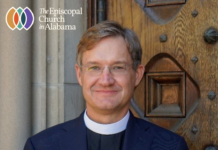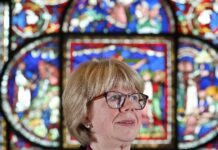Dear brothers and sisters in Christ,
May the Peace of our Risen Lord be with you!
Easter comes quietly to a world altered by extraordinary circumstances. COVID-19 has spread around the globe. At the time of this writing, over a million people are infected and seventy thousand have died from it. In Hong Kong, over nine hundred people are infected and four have died. Many countries are imposing stringent measures to contain the outbreak and are setting up strict regulations that place severe restrictions on people’s daily lives, social interactions, and religious activities. The pandemic has dealt a ruthless blow to the economic system, which people took pride in, and has posed challenges to social security systems, and governments’ ability to govern. Countless people now live in dire circumstances because of the damages done to the economy. This is the most challenging crisis and the gravest disaster that humanity has ever faced since the Second World War. Twenty five million people are estimated to become unemployed and the world economic loss is estimated to be about twenty six trillion Hong Kong dollars.
Although economic contraction and deteriorating livelihood are the main causes for anxiety, the loss of lives is an even greater cause for sadness and fear. A Chinese author wrote in her diary: “Death causes the most sadness in the pandemic, particularly the deaths of people close to us and the death of school friends.” A young Italian nurse said in tears “I have never seen so many people died. The line of corpses being pushed out of the hospital was like an unending stream”. The Pope was shocked and pained by the many elderly people who died alone in hospitals, without their families present to offer comfort.
In the face of such suffering and difficulties, people’s faith is inevitably challenged, and their trust in God is also shaken. They could not help but ask “Where is God?”, “Why did God watch us suffer without lending us a helping hand?”, and “When will the pandemic end so that people can return to their normal lives?” These are difficult questions to answer. Perhaps we can learn from Easter about our relationship with God at this time of difficult circumstances and how to face this unprecedented challenge and disaster. The answer to all the above questions is “Jesus Christ”.
If we have not wholly accepted the death of Jesus Christ, then we cannot celebrate the mystery of his Resurrection. Jesus faced the darkness of death and waited for his Resurrection with obedience, and God raised him from the dead. The Bible and the early church did not say “Jesus rises from the dead”, but “God raised him from the dead.” Jesus rose from the dead because he was obedient to God and could therefore experience this leap in faith. As Christians, we must also learn to experience this lesson in obedience.
Jesus Christ returned in triumph from the darkness of death. He triumphed because he defeated death. As his disciples, we, too, must experience the same triumph and will surely be risen. This is to say that God will not die. He gave us the most surprising and beautiful gift, that is through his Resurrection comes our own resurrection. Since Jesus Christ returned to life in his human body, we, as human beings, can also triumph over death and be free from its clutches. The power of darkness appears to be prevailing, but Jesus Christ had long triumphed over it. We have to put our trust in the triumphal Lord and not to let ourselves be enslaved by darkness.
Jesus Christ’s Resurrection fills Christians with hope. This hope is not merely a superficial and exaggerated optimism that is unconfirmed by facts. This hope is our trust in God. Good Friday is a day of darkness and death, the Holy Saturday that follows is also a day of emptiness and sadness. These two days are filled with suffering and disappointment, but Easter Sunday is a day filled with life and joy, like the dawn that is certain to come after the darkness of the night. Death, which is the ultimate enemy, has already been defeated.
Today, we are living under the shadow of the pandemic and are in the middle of darkness. It is like experiencing Good Friday, a day for pain, sadness, fear and death. However Easter gives us the strength and faith to face all difficulties and the hope to triumph over all. This is because we know that every Good Friday is followed by an Easter Sunday, just as the dawn arrives after the darkness of the night. The good news is that we don’t have to wait until death to experience resurrection but can experience the resurrected life during these difficult times. Moreover, we can share our resurrected life with others. Therefore we must open our hearts to God and place our trust in him with humility.
In the face of this pandemic, there are several things we can reflect upon:
1. We are convinced that God, who had resurrected Jesus Christ, is with us and is guiding us during times of suffering. God did not abandon Jesus Christ at his Passion. Anglican liturgical texts for the Eucharist clearly state that God is watching over us throughout the good times and the bad: “In obedience to you, our Creator, we might rule and serve all your creatures. When our disobedience took us far from you, you did not abandon us to the power of death.” The Cantonese hymn Sunny and rainy days has two verses that carry messages of comfort and promise “God will protect me as I go forward” and “God promises to never abandon me”.
2. Learn to be grateful. The pandemic reminds us that we often forget to give thanks to God and to others for the many kindnesses they have shown us but instead we have taken them for granted. According to an unconfirmed piece of news, a ninety-three year old man in Italy, whose condition had improved from COVID-19, was handed an expensive bill for using the ventilator. Upon receiving the bill, he broke down in tears. A doctor rushed to comfort him and told him not to worry about the expenses, but was instead deeply touched by the elderly man’s reply. The elderly man said “I am not crying because I need to pay since I can pay! I am crying because I have been breathing the air God has given me for ninety three years free of charge. Using the ventilator for a day in the hospital costs five thousand euros. Do you know how much I owe God? I have never been more thankful to him.” It does not matter whether this story is true or not. The anecdote reminds us not to forget to be grateful to God and to others for all we are given when we can still breathe air freely and free of charge. A well-known Chinese idiom reads “We remember those who help us for a thousand years; the fragrance of flowers given to us will linger for ten thousand years.”
3. What matters most to us when we are living through this pandemic? The pandemic strikes everyone equally, irrespective of national boundaries and social groups. It can affect people of all races, skin colours, religions, positions in society, genders, age, and political views. People take pride in security, achievements, systems, and products, and spend their lives pursuing material gains, wealth, and honour; but all of these prove ineffective in protecting them against the virus. Bill Gates hit the nail right on the head when he said that in times of difficulty, only food, water, and medicine are essential. His words made us understand that all luxury items, and even warships, canons, nuclear bombs and powerful firearms are useless against this disaster.
4. The pandemic reminds us that aside from the items mentioned by Bill Gates, the most important thing is love. A BBC Radio host said that the pandemic forces people all over the world to slow down and reflect upon how big we really are, and how little control we really have. So what really matters? Love. Loving one another is an expression of the resurrected live. A life lived for others is a life resurrected. According to an essay on the internet, the Pope wrote “Rivers don’t drink their own water; Trees don’t eat their own fruits. The Sun does not shine for itself; And flowers do not spread their fragrance for themselves. Living for others is a rule of nature. We are all born to help each other. No matter how difficult it is… Life is good when you’re happy; but it is much better when others are happy because of you!”
We have to care for the people around us during the pandemic, and support the medical professionals who toiled for us, as well as the people in the government, who have remained in their posts to fight against the virus. We must also care for the vulnerable communities, who are helpless, unemployed and furloughed, and have desperate needs. I love this prayer: “During this time when we cannot physically wrap our arms around each other, let us yet find ways to be the loving embrace of God to our neighbors.”
Brothers and sisters in Christ, we have to pray to God for his grace during this pandemic, and open our hearts to firmly believe that Jesus Christ has triumphed over death. Let us live courageously and stride into the future with faith and hope, because Jesus Christ, who loves us, had already walked this path before. He comforts and encourages us by saying “I have said this to you, so that in me you may have peace. In the world you face persecution. But take courage; I have conquered the world!” (John 16:33)
Lastly, let me borrow a few words from the speech of Queen Elizabeth II, delivered last week, to lend encouragement to everyone: “While we may have more still to endure, better days will return. We will be with our friends again. We will be with our families again. We will meet again.”
May the Lord bless every one of you with courage and peace so that you may have an Easter filled with joy and hope at the time of the COVID-19 pandemic.
Archbishop Paul Kwong, Anglican Church of Hong Kong



